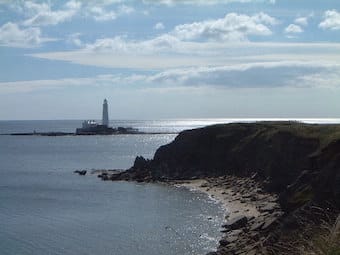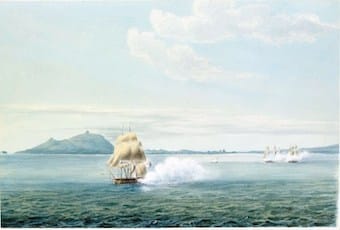Hartley in Northumberland lies just to the north of Whitley Bay and St Mary’s lighthouse. The Hartley Colliery Disaster on Thursday 16 January 1862 claimed 204 lives, and was commemorated in a poem by Skipsey. He tells vividly how seeping carbon monoxide overcame the rescuers as they struggled to reach those trapped in the shafts.
JOSEPH’S poetry reflects the harsh life of the pits where he worked until he was fifty, as well as his own tragedies.* Of eight children, he lost two to workplace accidents and three in one month to scarletina. His father, Cuthbert, was unlawfully killed by a policeman during a strike in 1832, when Joseph was three months old.
In 1863, friends hoped they had found him some relief as sub-librarian of the Literary and Philosophical Society in Newcastle.* Skipsey voraciously read the Lit-and-Phil’s books, but neglected to lend them to increasingly irate members. After a few unhappy months he returned to the pit, until retirement in 1882.
Skipsey then worked as a school caretaker and college porter,* until in 1889 he was invited to become curator of Shakespeare’s cottage in Stratford-upon-Avon.* Again the well-intentioned plan misfired: the mocking scepticism shown by some tourists towards the museum’s artefacts became so depressing that two years later he returned to Gateshead,* where he died on September 3rd, 1903.
See for example ‘Get Up!’, from ‘Carols from the Coalfields’ (1886).
See the Literary and Philosophical Society of Newcastle-upon-Tyne.
The jobs suited him quite well, but Watson felt there was something amiss when Skipsey was porter at Armstrong College (later Newcastle University). “I saw from that time that it was quite impossible to have a College where the scientific men came to see the Principal and the artistic and literary men came to see the porter.”
The list of those supporting his appointment is truly impressive, and includes among many others Robert Browning, Alfred Lord Tennyson, Edward Burne-Jones, Dante Gabriel Rossetti, Bram Stoker and William Morris. There was, however, a question about his strong Northumberland accent. “I know that my pronunciation is not quite like yours,” replied the big man with dignity, “but I must be allowed to say that I conceive it is much better, and should like to proceed to prove it.”
Watson explains that some visitors, notably those from the USA, were convinced Baconians (people who think that Sir Francis Bacon wrote Shakespeare’s plays). “He felt that if he were to make this his life’s labour he would end by doubting the very existence of Shakespeare, and so he resigned his place and came home to the North.”
Précis
Skipsey’s poetry movingly evokes the miner’s uncertainties and family responsibilities: his own father was murdered during a strike, and he himself lost five of his eight children to disease or accident. Recognition brought him a brief tenure as as curator of Shakespeare’s birthplace in Stratford-upon-Avon, but he found it too commercialised and returned to Gateshead, where he died in 1903. (60 / 60 words)
Skipsey’s poetry movingly evokes the miner’s uncertainties and family responsibilities: his own father was murdered during a strike, and he himself lost five of his eight children to disease or accident. Recognition brought him a brief tenure as as curator of Shakespeare’s birthplace in Stratford-upon-Avon, but he found it too commercialised and returned to Gateshead, where he died in 1903.
Variations: 1.increase the length of this precis to exactly 65 words. 2.reduce the length of this precis to exactly 55 words. 3.introduce one of the following words into the precis: because, besides, if, just, must, since, whereas, who.
Archive
Word Games
Sevens Based on this passage
Suggest answers to this question. See if you can limit one answer to exactly seven words.
Variations: 1.expand your answer to exactly fourteen words. 2.expand your answer further, to exactly twenty-one words. 3.include one of the following words in your answer: if, but, despite, because, (al)though, unless.
Jigsaws Based on this passage
Express the ideas below in a single sentence, using different words as much as possible. Do not be satisfied with the first answer you think of; think of several, and choose the best.
Spinners Find in Think and Speak
For each group of words, compose a sentence that uses all three. You can use any form of the word: for example, cat → cats, go → went, or quick → quickly, though neigh → neighbour is stretching it a bit.
This exercise uses words found in the accompanying passage.
1 Kill. Show. Unhappy.
2 Old. Railway. Some.
3 During. Policeman. Scrape.
Variations: 1. include direct and indirect speech 2. include one or more of these words: although, because, despite, either/or, if, unless, until, when, whether, which, who 3. use negatives (not, isn’t, neither/nor, never, nobody etc.)
Add Vowels Find in Think and Speak
Make words by adding vowels to each group of consonants below. You may add as many vowels as you like before, between or after the consonants, but you may not add any consonants or change the order of those you have been given. See if you can beat our target of common words.
scrs (6+2)
saucers. scares. scars. scores. scours. secures.
screes. sucrose.
Post Box : Ask Nicholas
Grok : Ask Grok
You are welcome to share your creativity with me, or ask for help with any of the exercises on Clay Lane. Write to me at this address:
See more at Post Box.
If you like what I’m doing here on Clay Lane, from time to time you could buy me a coffee.
Buy Me a Coffee is a crowdfunding website, used by over a million people. It is designed to help content creators like me make a living from their work. ‘Buy Me a Coffee’ prides itself on its security, and there is no need to register.
Related Posts
Robert Browning, aboard ship in sight of Gibraltar, reflects on the momentous events in British history that have happened nearby.
Picture: By Thomas William Ogilvie McNiven (1792-1870), via Wikimedia Commons. Licence: Public domain.. Source.
Posted May 7 2020
Picture: Imperial War Museums, via Wikimedia Commons. Licence: Public domain.. Source.
Posted June 29 2016






